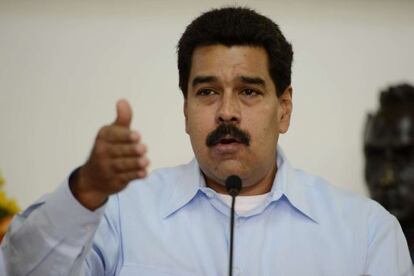Maduro pays tribute to Chávez’s decision to exit rights convention
The late President Chávez had accused the regional panel of meddling in domestic affairs

Venezuela on Tuesday officially withdrew its membership from the American Convention on Human Rights following a directive from the late Hugo Chávez. Just months before his March 5 death, the former president had accused the Washington-based panel of meddling in domestic affairs.
Because of the decision, the Inter-American Commission on Human Rights (IACHR) and the Costa Rica-based Inter-American Human Rights Court — which both form part of the Organization of American States — will have limited jurisdiction in cases that are filed from Tuesday. Caracas’ move also leaves in the air the 16 sentences handed down against Venezuela in human rights cases between 1995 and 2012 — including some $9.7 billion in compensation payments to more than 250 victims — which have been partially complied with.
“It was the best decision to be taken by Chávez,” President Nicolás Maduro said Tuesday. “The system had become an instrument of persecution for liberal governments in the region.”
Just a day before the withdrawal became official, opposition leader Henrique Capriles and his supporters filed a petition with the IACHR to declare last April’s presidential election void. Capriles has alleged that there was widespread fraud at the ballot boxes — an election that was narrowly won by Maduro, Chávez’s handpicked successor.
The Supreme Court in Venezuela dismissed Capriles’ petition
Last month, the Supreme Court in Venezuela dismissed Capriles’ petition to void the presidential election. The opposition has also threatened to take the fight to other international forums.
Venezuela was one of the original signatories of the American Convention on Human Rights — also known as the “Pact of San Jose, Costa Rica” — in November 1969. The 82 articles of the convention establish the duties that governments must follow to guarantee the human rights of their citizens. It also empowers the Inter-American Commission on Human Rights to recommend and promote guarantees in the region, while the San Jose-based court is in charge of passing down judgment on governments if the commission’s findings are not followed.
Three years ago, Venezuela began complaining about the regional Inter-American rights system, when the IACHR released a report underscoring the deterioration of personal guarantees in the country. “That’s nothing but a mafia over there,” said a cancer-stricken Chávez in February 2010, before ordering his Foreign Ministry to begin the formal process of withdrawing from the commission.
Since 1995, the Inter-American court has issued 16 rulings against the government, including the 1988 El Amparo massacre of 18 fishermen by the Venezuelan military, who falsely claimed they were armed Colombian guerrillas. The court also ruled against the government for the 1989 murders and injuries caused by police and military as they tried to put down days of disturbances over IMF policies during the administration of President Carlos Andrés Pérez.
Although these incidents happened before Chávez was elected in 1998, many of the soldiers and police that were found guilty for murder, torture and disappearances are now generals and commanders.
Despite the government’s withdrawal from the convention, the IACHR can still monitor events in Venezuela and issue reports, hold hearings and make recommendations on incidents that take place in the country. The Inter-American Court will only be able to take up cases relating to events that occurred in the country before September 10, 2013.
Tu suscripción se está usando en otro dispositivo
¿Quieres añadir otro usuario a tu suscripción?
Si continúas leyendo en este dispositivo, no se podrá leer en el otro.
FlechaTu suscripción se está usando en otro dispositivo y solo puedes acceder a EL PAÍS desde un dispositivo a la vez.
Si quieres compartir tu cuenta, cambia tu suscripción a la modalidad Premium, así podrás añadir otro usuario. Cada uno accederá con su propia cuenta de email, lo que os permitirá personalizar vuestra experiencia en EL PAÍS.
¿Tienes una suscripción de empresa? Accede aquí para contratar más cuentas.
En el caso de no saber quién está usando tu cuenta, te recomendamos cambiar tu contraseña aquí.
Si decides continuar compartiendo tu cuenta, este mensaje se mostrará en tu dispositivo y en el de la otra persona que está usando tu cuenta de forma indefinida, afectando a tu experiencia de lectura. Puedes consultar aquí los términos y condiciones de la suscripción digital.








































